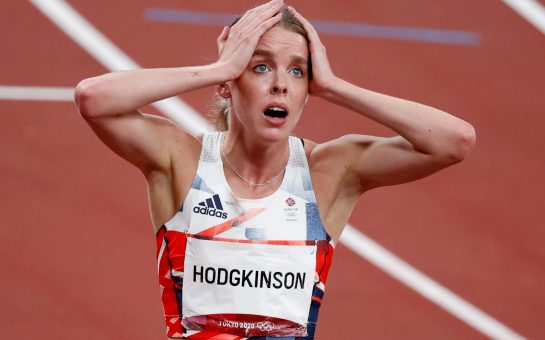When Mixed Martial Arts fighter Ronda Rousey recently took to Instagram to apologise for sharing a photograph that ‘was altered without [her] knowing to make [her] arms look smaller’, the old debate about body image in sport reared its ugly head.
And rightly so – why would you need to Photoshop one of the most popular upcoming female athletes?
Rousey said: “This goes against everything I believe and I am extremely proud of every inch of my body.”
Paralympic swimmer Ellie Simmonds, who was born with Achondroplasia dwarfism, told MM: “I personally don’t feel like there is pressure.
“I think there is that certain way [for us to look] – I think it’s just for us to be in the best shape possible.
“I think as an athlete you have to nutritionally give yourself the best energy and you have to look the best because that’s what is needed.
“You need muscles.”
In 2014 a survey undertaken by BT Sport found that 80% of 110 female athletes said they felt under pressure to conform to a certain appearance and body image.
You just need to see the insults hurled at tennis player Serena Williams – arguably the greatest female player ever – mocking her ‘manly’ physique to see that this can be a serious issue for female athletes.
Many of those who took part in the BT Sport survey claimed that the pressure to conform to a certain body type primarily came from the media and from fellow athletes, with a number of participants also considering ‘society in general’ to be a major factor as they have ‘an expectation of what women should look like’.
Some also mentioned the pressure put on appearance as well as body image, noting that ‘stereotypically attractive female athletes’ get more sponsorship and advertising opportunities.
Olympic weightlifter Sarah Robles, who at the time was ranked higher any other male or female U.S. weightlifter, had trouble finding sponsorship to take her to the London 2012 Olympics because she is ‘a girl who’s built like a guy’ rather than a ‘girl who looks good in a bikini’.
One respondent commented: “It seems to me that often the ‘worth’ of a female athlete is based far more on how she looks than on her results in sport.
“Female athletes’ appearance is also widely commented on, often either critically or with a sort of lecherous admiration.”
Just look at swimmer Rebecca Adlington’s decision to undergo surgery to straighten her nose.
The four-time Olympic medallist had been frequently subject to criticism for her appearance, with one comedian comparing her to a dolphin.
On the other hand, go take a glance at the petition made in an attempt to prevent 17-year-old tennis player Simona Halep from havng a breast reduction.
Simona’s 34DD breasts were causing her pain during matches and were restricting her movement.
Her reduction to 34C brought her up 450 places in the world rankings, yet the petition clearly shows that some members of the public were more concerned with her assets than her achievements.
The survey respondent argued that: “This barely ever happens to male top athletes, who are valued on their results.”
However, it seems that this isn’t completely true as research suggests that male athletes also feel a pressure to conform to both a specific body image and appearance.
Eating Disorder Hope – an organisation which ‘offers education, support, and inspiration to eating disorder sufferers’ – reported that 5 -10% of people suffering from anorexia are males, 45% of which are involved in ‘an occupation or athletic team in which control of weight is important for good performance’.
And remember when footballer Wayne Rooney had a hair transplant after his teammates nicknamed him ‘Bobby Charlton’ for his receding hairline?
Harry Pointon, a personal trainer working in Manchester, told MM: “In the past I definitely felt pressured to look a certain way.”
“As a personal trainer my experience is with the general population and not professional athletes, but men are definitely more concerned with their image these days.
“I think this is most likely due to social media putting certain areas of people’s lives on a pedestal and then others trying to compete with these.
“For everyday gym goers who want to look like an athlete and try to train like one around an already busy lifestyle, it probably adds a lot of unnecessary stress and leaves many feeling disappointed when they don’t achieve the expected results.”
But, of course, the pressure to conform to a specific body image not only varies across different genders, but also across different types of sports.
Professor Sarah Grogan, Professor of Psychology Health and Wellbeing at Manchester Metropolitan University, said: “There is some evidence that athletes who are involved in ‘lean’ sports [running, gymnastics] where being slender can offer them a competitive advantage, feel under pressure to be extremely slender.
Yet, for those involved in sports requiring more strength, muscle dysmorphia, or ‘reverse anorexia’, is a worrying impact of the attempt to conform to ‘masculine’ ideals.
Muscle dysmorphia is a condition where someone becomes preoccupied with the size of their muscles and becomes fearful of appearing weak.
Some research suggests that around 10% of body builders could be suffering from this condition.
Yet Harry said: “I would guess that professional athletes who compete in sport don’t really care too much about body image, they will be training primarily to be successful at their chosen sport and just happen to be in great shape as a by-product of their hard work.”
Professor Grogan heldd a similar view, telling MM that: “Regular exercise has been found to be protective against body dissatisfaction in both men and women, probably because of increased self-efficacy produced by the exercise, so athletes may be at an advantage in this respect relative to others within the general population.”
While the need to conform to a certain body image and appearance may not have drastic effects on every athlete, it is clear that this is still an issue that can sometimes have devastating consequences for those who try to conform to society’s ideals.
Harry said: “I believe we should be focusing on long term health and feeling generally good – fitting health and fitness into our lifestyles in an enjoyable way, not living a restrictive life so we can temporarily look impressive at a photo shoot.”
Image courtesy of Disney-ABC, ITV and ESPN, all via YouTube, with thanks



